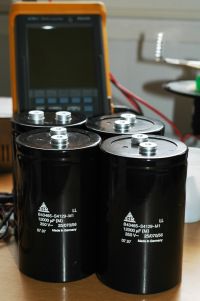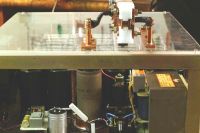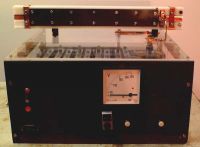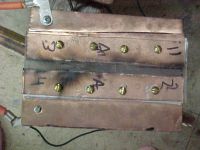
Suitable caps for pulse application (railgun)?
The Wumpus, Fri May 19 2006, 03:39PMThis summer I plan to build a medium-sized electromagnetic projectile launcher, probably a railgun since I've built a number of coilguns in my halycon days of youth and am looking for the challenge. Anyway I just picked up four cheap electrolytic caps rated 12000uF at 350 V:
The caps are marked
S+M: B43465-S4129-M1
I don't find any info about these being pulse rated. They do have sturdy aluminum terminals with M6 threaded holes.

Any idea if they are suitable for pulse applications, and also, is there a simple way to measure ESR or at least get a rough estimate using multimeter/scope and common components? Thanks in advance.
Re: Suitable caps for pulse application (railgun)?
Desmogod, Fri May 19 2006, 03:45PM
I have used non pulse rated caps for pulse applications before with no worries.
I think problems start to occur if you cycle them too quickly, like in a Tesla coil.
Others will know better, but I would say it should be fine.
Desmogod, Fri May 19 2006, 03:45PM
I have used non pulse rated caps for pulse applications before with no worries.
I think problems start to occur if you cycle them too quickly, like in a Tesla coil.
Others will know better, but I would say it should be fine.
Re: Suitable caps for pulse application (railgun)?
The Wumpus, Fri May 19 2006, 04:30PM
Yes, I used to parallell lots of power supply filter caps (400V 330uF) for coilguns and never had any catastrophic failures. However this was at a few hundred J max.
The Wumpus, Fri May 19 2006, 04:30PM
Yes, I used to parallell lots of power supply filter caps (400V 330uF) for coilguns and never had any catastrophic failures. However this was at a few hundred J max.
Re: Suitable caps for pulse application (railgun)?
Cesiumsponge, Sat May 20 2006, 12:25AM
Those should work in a pinch and I think basically everyone that has ventured into pulsed power has used electrolytics on one scale or another due to availability and pricing. Real pulse-rated, rectangular cased capacitors are usually very expensive, or you have to get very lucky (and heavy too).
If you're going big, even those terminals tend to spark (in my experience) so I'd personally suggest using some conductive electrical joint compound to cut down or eliminate that. Perhaps I didn't crank down on my terminals hard enough, but it's very easy to strip aluminum threads and they aren't rated at high torque to begin with (plus aluminum oxide is always pesky).
Cesiumsponge, Sat May 20 2006, 12:25AM
Those should work in a pinch and I think basically everyone that has ventured into pulsed power has used electrolytics on one scale or another due to availability and pricing. Real pulse-rated, rectangular cased capacitors are usually very expensive, or you have to get very lucky (and heavy too).
If you're going big, even those terminals tend to spark (in my experience) so I'd personally suggest using some conductive electrical joint compound to cut down or eliminate that. Perhaps I didn't crank down on my terminals hard enough, but it's very easy to strip aluminum threads and they aren't rated at high torque to begin with (plus aluminum oxide is always pesky).
Re: Suitable caps for pulse application (railgun)?
pulslaser, Sat May 20 2006, 11:59AM
I used smaller caps (30 x 5700µ) of similar construction and they work very well in a railgun. You see the caps behind the ignitron. Like Cesiumsponge I got sparking at some of the contacts as long I didn't use soft tin foil between the studs and the busbars


pulslaser, Sat May 20 2006, 11:59AM
I used smaller caps (30 x 5700µ) of similar construction and they work very well in a railgun. You see the caps behind the ignitron. Like Cesiumsponge I got sparking at some of the contacts as long I didn't use soft tin foil between the studs and the busbars


Re: Suitable caps for pulse application (railgun)?
The Wumpus, Sat May 20 2006, 07:30PM
pulsslaser, that's a very neat setup indeed. I was contemplating sanding away the oxide from the studs and wrapping a few leafs of sheet gold on them just before mounting to the busbars. Might be a bit overkill, but at least that should ensure good contact.
The Wumpus, Sat May 20 2006, 07:30PM
pulsslaser, that's a very neat setup indeed. I was contemplating sanding away the oxide from the studs and wrapping a few leafs of sheet gold on them just before mounting to the busbars. Might be a bit overkill, but at least that should ensure good contact.
Re: Suitable caps for pulse application (railgun)?
McFluffin, Wed Jun 28 2006, 05:59AM
I used lock nuts on the bus bar along with washers on top. I have yet to have any problems sparking on the capacitors. HOWEVER, I have had several bad exerpiences with sparking between contacts. Even when I was using some silver plated copper contacts, it still would eventually get dirty or something and start sparking. I found that having things connected in at least two places, even if weakly in the second, seemed to help a lot.
It also seems to me that running a 10kV railgun like I see some do is not very well suited even for several kJ. Were you getting near complete discharges on your caps? I usually only had less than a hundred joules left even after a several kJ shot on my mini railgun. You can see in the attached pic where I took damage from firing.

McFluffin, Wed Jun 28 2006, 05:59AM
I used lock nuts on the bus bar along with washers on top. I have yet to have any problems sparking on the capacitors. HOWEVER, I have had several bad exerpiences with sparking between contacts. Even when I was using some silver plated copper contacts, it still would eventually get dirty or something and start sparking. I found that having things connected in at least two places, even if weakly in the second, seemed to help a lot.
It also seems to me that running a 10kV railgun like I see some do is not very well suited even for several kJ. Were you getting near complete discharges on your caps? I usually only had less than a hundred joules left even after a several kJ shot on my mini railgun. You can see in the attached pic where I took damage from firing.

Re: Suitable caps for pulse application (railgun)?
Self Defenestrate, Tue Jul 04 2006, 05:42AM
Look fine to me. As for oxide build on terminals, I always polish my contacts with a buffing head on my dremel. Crank it tight, and you should have no problems whatsoever with contact.
Self Defenestrate, Tue Jul 04 2006, 05:42AM
Look fine to me. As for oxide build on terminals, I always polish my contacts with a buffing head on my dremel. Crank it tight, and you should have no problems whatsoever with contact.
Re: Suitable caps for pulse application (railgun)?
Sulaiman, Tue Jul 04 2006, 09:18AM
For pulse discharging the currents are very high (hopefuly)
The busbars on the capacitor bank receive large mechanical impulse forces
due to the magnetic field caused by the current pulses.
Check the tightness of the connections frequently to avoid sparking.
Sulaiman, Tue Jul 04 2006, 09:18AM
For pulse discharging the currents are very high (hopefuly)
The busbars on the capacitor bank receive large mechanical impulse forces
due to the magnetic field caused by the current pulses.
Check the tightness of the connections frequently to avoid sparking.
Print this page